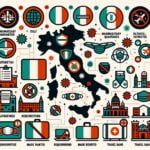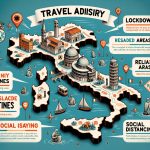Italy, renowned for its rich history, cultural heritage, and exquisite cuisine, has long been a top destination for travelers worldwide. However, the global COVID-19 pandemic has had a profound impact on the country’s vibrant tourism industry. In light of current travel restrictions in Italy due to the ongoing pandemic, it is crucial for visitors to be informed about the latest regulations and guidelines.
The unprecedented spread of COVID-19 has forced Italy to implement strict measures to curb the virus’ transmission within its borders. As a result, travel restrictions have been enforced to protect public health and safety. These restrictions include entry requirements, quarantine protocols, and updates on the evolving situation regarding COVID-19 in Italy.
Travelers planning a trip to Italy must navigate through various entry requirements set by the Italian government. These may include providing proof of vaccination, negative test results, or adhering to specific quarantine protocols upon arrival. Staying informed about the latest updates on travel restrictions in Italy is essential to ensure a smooth and hassle-free journey during these challenging times.
Impact of COVID-19 on Italy’s Tourism Sector
Italy’s tourism sector has been significantly impacted by the COVID-19 pandemic, with travel restrictions and lockdown measures hampering the flow of tourists into the country. The once vibrant streets of Rome, Venice, and Florence were left eerily quiet as hotels, restaurants, and attractions were forced to close their doors to visitors.
According to the World Travel & Tourism Council, the tourism industry in Italy faced a 63% decline in revenue in 2020 compared to the previous year, reflecting the grave impact of the pandemic on one of the country’s key economic drivers.
The implementation of current travel restrictions in Italy has been crucial in controlling the spread of COVID-19 within its borders. As of now, travelers from most countries are allowed to enter Italy for essential reasons only, such as work, study, or medical emergencies.
Tourist travel is currently restricted, with limited exceptions for those coming from countries outside of the European Union or Schengen Area where specific conditions are met. It is essential for travelers to stay updated on these restrictions as they may change depending on the evolving situation.
To further complicate matters, entry requirements for travelers to Italy have become more stringent due to the ongoing pandemic. Before embarking on their journey, visitors must fill out a self-declaration form stating their reasons for entering Italy and undergo COVID-19 testing both prior to departure and upon arrival.
Quarantine protocols vary depending on individual circumstances and test results but typically range from self-isolation at a designated location to mandatory quarantine at home or accommodation. It is imperative for travelers to familiarize themselves with these requirements to ensure a smooth entry into Italy during these challenging times.
Overview of Current Travel Restrictions in Italy
Italy, known for its rich history, art, and cuisine, is a popular destination for tourists from around the world. However, the COVID-19 pandemic has had a significant impact on Italy’s tourism industry, leading to the implementation of various travel restrictions to control the spread of the virus. Understanding the current travel restrictions in Italy is essential for anyone planning a trip to this beautiful country.
To navigate the current travel restrictions in Italy effectively, it is important to stay informed about the latest updates and guidelines set by the Italian government. Here are some key points regarding the current travel restrictions in Italy:
- Travelers arriving from EU countries, Schengen Area countries, or countries on the EU safe list are allowed entry without quarantine.
- Travelers arriving from non-EU countries may be subject to quarantine requirements based on their vaccination status and country of origin.
- Masks are mandatory in indoor public spaces and on public transportation.
Entry requirements for travelers to Italy have also been adapted to ensure the safety of both visitors and residents. Before traveling to Italy, tourists should check for any specific entry requirements that may apply to their situation. Some common entry requirements include:
- Completing a self-declaration form before entering Italy stating the purpose of travel.
- Possessing proof of either full vaccination against COVID-19, a negative test result, or recovery from COVID-19 within a specific timeframe.
- Following screening procedures at airports and other ports of entry upon arrival in Italy.
As the situation with COVID-19 continues to evolve, travelers must stay updated on any changes or updates regarding travel restrictions in Italy. By adhering to these guidelines and staying informed about current travel restrictions in Italy, visitors can help protect themselves and others while enjoying all that this captivating country has to offer.
Entry Requirements for Travelers to Italy
Italy has long been a popular destination for travelers around the world, known for its rich history, stunning landscapes, and delectable cuisine. However, the tourism industry in Italy has been significantly impacted by the COVID-19 pandemic. With travel restrictions in place to curb the spread of the virus, many visitors have had to alter their travel plans or cancel altogether.
As of now, Italy has implemented certain entry requirements for travelers to help contain the spread of COVID-19. All travelers entering Italy from certain countries are required to present a negative PCR test taken within 48 hours before their arrival. Additionally, travelers must also fill out a self-declaration form stating their reason for entering Italy and agreeing to adhere to quarantine protocols if necessary.
Quarantine protocols for incoming visitors vary based on the traveler’s country of origin and recent travel history. Some travelers may be required to undergo a mandatory quarantine upon arrival in Italy, while others may only need to monitor their health and report any symptoms if they arise. It is important for visitors to stay informed about the current travel restrictions in Italy and adhere to all guidelines set forth by local authorities.
Quarantine Protocols for Incoming Visitors
Requirements Upon Arrival
Upon arrival in Italy, travelers are subject to specific quarantine protocols depending on their country of origin and recent travel history. Currently, individuals arriving from countries outside the European Union, Schengen Area, United Kingdom, and certain other countries are required to undergo a period of self-isolation upon entry. The duration of quarantine varies but typically ranges from 5 to 14 days.
Testing and Monitoring
In addition to quarantine measures, incoming visitors may also be required to present a negative COVID-19 test result taken within a specified timeframe prior to their arrival in Italy. Travelers should be prepared to provide proof of this test result at the border and may be subject to further testing or health screenings upon entry. Health authorities in Italy continue to monitor the situation closely and may adjust testing requirements based on the prevailing conditions.
Exceptions and Regulations
It is important for travelers to familiarize themselves with the specific quarantine protocols and regulations that apply to their situation before embarking on their journey. Some travelers may qualify for exemptions from quarantine requirements based on factors such as vaccination status or essential travel purposes.
However, it is essential to stay informed about any changes in regulations or exceptions that may impact incoming visitors. By staying up-to-date with current travel restrictions in Italy, travelers can ensure a smoother and more compliant experience during their trip.
Updates on the COVID-19 Situation in Italy
Italy has been among the countries heavily impacted by the COVID-19 pandemic, with the tourism industry facing significant challenges. As one of the most visited countries in the world, Italy relies heavily on tourism for its economy. The current travel restrictions in Italy have been implemented to safeguard public health and prevent the spread of the virus within its borders.
COVID-19 Cases and Response
Italy was one of the first countries in Europe to be hit hard by the coronavirus outbreak. The government took swift action in implementing lockdown measures and strict protocols to control the spread of the virus. Over time, as cases decreased, restrictions were gradually lifted to revive economic activities while prioritizing public safety.
Vaccination Rollout
With a steady rollout of vaccinations across Italy, there has been a ray of hope for resuming normalcy. The country has made significant progress in vaccinating its population, which has contributed to a decline in COVID-19 cases.
This progress has allowed authorities to consider easing some travel restrictions in a phased manner, albeit with caution and monitoring of the situation. It is crucial for travelers to stay updated on vaccination requirements and guidelines for entry into Italy amid evolving circumstances.
As the situation continues to evolve, it is essential for travelers planning a trip to Italy to stay informed about the current travel restrictions and guidelines set forth by Italian authorities.Keeping abreast of updates will enable visitors to navigate their travel plans effectively amidst changing regulations and ensure a safe and enjoyable experience in Italy.
Tips for Navigating Travel Restrictions in Italy
Italy has always been a popular destination for tourists around the world, known for its rich history, beautiful landscapes, and delectable cuisine. However, the COVID-19 pandemic brought unprecedented challenges to the country’s tourism sector. With the implementation of strict health and safety measures, navigating travel restrictions in Italy has become essential for anyone planning a trip to this beloved destination.
As of the current travel restrictions in Italy, travelers should be aware that entry into the country is generally permitted for visitors from most countries, but certain requirements must be met. These include filling out a self-declaration form before arrival, providing proof of either vaccination, recovery from COVID-19 within a specified period, or a negative PCR test result taken no more than 48 hours before entry.
Upon arrival in Italy, travelers may also be subject to quarantine protocols depending on their vaccination status and recent travel history. It is important to check the latest guidelines issued by Italian authorities to ensure compliance and avoid any disruptions to your travel plans. Additionally, staying informed about the evolving COVID-19 situation in Italy through official channels is crucial for a safe and smooth travel experience in the country.
Despite the challenges posed by the pandemic, there are still ways to explore and enjoy all that Italy has to offer while adhering to current travel restrictions. By planning ahead, monitoring updates on entry requirements and quarantine protocols, and practicing responsible tourism during your visit, you can make the most of your trip while prioritizing safety and well-being. Remember that flexibility and patience are key when traveling during these uncertain times.
| Travel Restriction | Details |
|---|---|
| Entry Requirements | Filling out a self-declaration form, providing proof of vaccination/recovery/negative test |
| Quarantine Protocols | Dependent on vaccination status and recent travel history |
| COVID-19 Situation Updates | Vital for staying informed during your time in Italy |
Future Outlook for Travel in Italy
Italy’s tourism industry has faced significant challenges due to the impact of the COVID-19 pandemic. With its rich history, iconic landmarks, and vibrant culture, Italy has long been a top destination for travelers from around the world. However, the ongoing health crisis has led to a sharp decline in tourism numbers, causing economic strain on businesses and communities that rely heavily on tourism revenue.
As countries strive to control the spread of the virus, travel restrictions have been implemented globally. Italy, being one of the early epicenters of the pandemic in Europe, has also imposed strict measures to protect its citizens and visitors. These current travel restrictions in Italy include requirements for pre-arrival testing, mandatory quarantine upon entry for certain countries, and limitations on movement within regions.
Travelers planning a trip to Italy must be aware of the entry requirements set by Italian authorities. Depending on their country of origin, visitors may need to present negative COVID-19 test results or undergo testing upon arrival.
Additionally, travelers may be subject to quarantine protocols based on their recent travel history or if they exhibit any symptoms related to the virus. It is crucial for tourists to stay informed about these regulations and comply with them to ensure a smooth and safe trip during these uncertain times.
Despite the challenges posed by the current travel restrictions in Italy, there is optimism for the future of travel in this beloved destination. As vaccination efforts ramp up globally and health protocols become more standardized, there is hope for a gradual easing of restrictions and a revival of tourism in Italy.
The country’s resilience and commitment to ensuring the safety of both residents and visitors bode well for a gradual return to normalcy in the tourism sector. Travelers are encouraged to stay updated on the latest guidelines and resources provided by Italian authorities as they plan their future travels to this enchanting country.
Resources for Travelers to Stay Informed About Current Travel Restrictions in Italy
Italy has been a beloved destination for travelers around the world, renowned for its rich history, culture, and cuisine. However, the unprecedented impact of COVID-19 has brought about significant changes in Italy’s tourism sector. The country has implemented strict measures to ensure the safety of both residents and visitors, leading to current travel restrictions in Italy that travelers need to be aware of.
As of now, Italy continues to enforce various restrictions to manage the spread of COVID-19 within its borders. Travelers entering Italy are subject to specific entry requirements, including presenting a negative test result or proof of vaccination. Additionally, quarantine protocols may apply depending on the traveler’s origin country or recent travel history. These measures are crucial in controlling the transmission of the virus and ensuring public health safety.
To navigate these current travel restrictions in Italy successfully, travelers are advised to stay updated on the latest developments regarding COVID-19 in the country. Monitoring updates on case numbers, vaccination efforts, and any changes to entry requirements can help individuals plan their trip effectively.
Utilizing reliable resources such as official government websites or contacting local authorities can provide accurate information on what to expect when traveling to Italy during these times. Stay informed and prepared for a safe and enjoyable experience while exploring all that Italy has to offer.
Frequently Asked Questions
Are There Any Restrictions to Travel to Italy?
Travel to Italy is currently restricted due to the COVID-19 pandemic. Non-essential travel from countries outside the EU is limited, and travelers may be subject to quarantine or testing requirements upon arrival.
What Is Required for a US Citizen to Visit Italy?
For a US citizen to visit Italy, a few requirements must be met. These include having a valid passport, obtaining any necessary visas or permits for longer stays, and complying with current COVID-19 regulations such as testing and quarantine.
Is There a Travel Warning for Italy?
As of now, there are no specific travel warnings issued for Italy by the US Department of State. However, travelers are advised to stay informed about current conditions and follow local regulations and guidelines related to COVID-19 safety measures during their visit.

I’m a passionate traveler, writer, and Italophile. My fascination with Italy’s history, art, and culture has led me on countless adventures across the Italian landscape. Through “I Live Italy,” I share my love for this extraordinary country and aims to inspire others to explore its boundless beauty.





